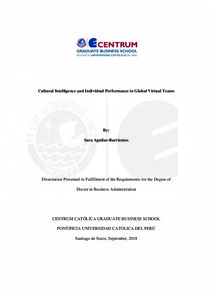Cultural intelligence and individual performance in global virtual teams
Abstract
The purpose of this research was to find the relationship that exists between cultural
intelligence and contextual performance, when moderated by cultural diversity in global
virtual teams. A sample of 215 employees from a multinational services company was used.
Data analysis was performed using a multi-group invariance structural equation model (x2/df%
= 1.22, p > .01; RMSEA = .05; CFI = .97; SRMR = .08). There was a positive and significant
correlation between cultural intelligence and contextual performance, which led to accept
hypothesis 1 (Group 1: H1, Y11=.52, p<.01; Y12=.74, p<..01. Group 2: Y1'=.28, p<.01;
Y12=.39, p<.01). Categorical moderation revealed that a high cultural diversity, increases the
relationship between the independent and dependent constructs, therefore hypothesis 2 was
also accepted (H2, Y11=.52, Y12=.74 > Y11=.28, Y12=.39). This allowed concluding that having
cultural intelligence impacts positively individual contextual performance in global virtual
teams, and that the more culturally diverse people are in the work unit, the higher is this link.
Temas
Cultura organizacional
Diversidad en el lugar de trabajo
Empresas internacionales
Inteligencia cultural
Investigación cuantitativa
Diversidad en el lugar de trabajo
Empresas internacionales
Inteligencia cultural
Investigación cuantitativa
Para optar el título de
Doctor en Administración Estratégica de Empresas
Collections
The following license files are associated with this item:






